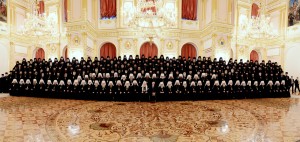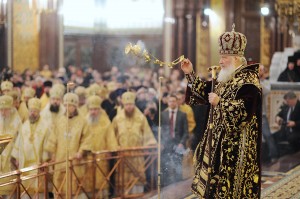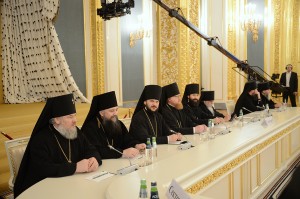Dear Reverend Fathers, dear brothers and sisters in Christ!
I would like to devote my message for this annual meeting of our Cathedral to the Holy Bishop’s Council of the Russian Orthodox Church that took place on the 2-5 of February in Moscow this year, and in which, according to the protocols of our Church, I participated.
In our days this Council takes place every two years. 280 bishops and 290 hierarchs of the Moscow Patriarchy of the Russian Orthodox Church joined it this year.
As always, the Holy Council was opened by the Divine Liturgy, dedicated to the 4th anniversary of the enthronement of His Holiness, the Patriarch of Moscow and All Russia, Kirill. On this memorable day I was helping His Holiness to serve the Liturgy. On behalf of the Patriarchal Parishes I congratulated His Holiness and wished Him “in the next year of His Patriarchal Mission generous mercies and abundant help from God, Our Lord -the Head of all bishops and priest. While presenting His Holiness with a picture album of our Canadian Churches, I also wished Him spiritual joy and excellent health and to All Our Holly Orthodox Church a safe and happy voyage through the boisterous sea of life to the secure harbour of Our Protector- Jesus Christ…”

Kremlin. A meeting of the Members of the Holy Council with the President of Russian Federation Vladimir Putin.
On the same day a meeting of the Members of the Holy Council with the President of Russian Federation Vladimir Putin took place in Kremlin. During this meeting the Head of the Russian State highly estimated and praised the work of the Holy Patriarch of Russian Orthodox Church and also answered to the row of questions of our Church’s hierarchs.
On the first day of the work of the Council (the 2nd of February) – His Holiness, Holy Patriarch Kirill addressed us with a word about the life and work of Russian Orthodox Church. His Holiness touched, among others, the questions about formation of new metropolitan areas and eparchies, the life of our parishes abroad, financial and economic aspects of the Church life, and different problems of the religious education of our people. His Holiness underlined that the role of our Church in the life of the country for the last years was extremely dynamic; its missionary and social service- very successful and vital, which is well seen, for example, in the movement of the Orthodox young people, who nowadays actively form different charitable organizations and bring out to the society our Christian Moral values. His Holiness also pointed out to the importance of the Orthodox mass-media, through which the dialog with the society and the state is being held. The Head of the Russian Orthodox Church outlined the perspectives of the relationships between different branches of the Orthodox Church, as well as between Russian Orthodox Church and representatives both of the other Christian confessions and also of different religions.
It is important to remember that the Russian Orthodox Church, to which we belong and which we serve, includes people living on the territories that trespass the boundaries of the State of Russian Federation. Among them are those living in the countries that once were the parts of Russia and by now have become independent republics, those who live on the territories of China and Japan, where our Orthodox eparchies had been established a long time ago, and the multi-millions Russian diaspora of immigrants and their descendants, living in all the corners of the world! 400 Patriarchal parishes and 300 parishes of the Russian Orthodox Church Abroad scattered across all countries and continents outside Russia testify that the question of how to in a better way provide the Christian spiritual care to this people – is a burning question for our Church.
On the following days, the Members of the Holy Council, in true spiritual and ecclesiastical accordance, approved a number of documents, offered for their attention by the Council Presence.
Thus, the Council’s members have defined for the future
“The procedure of electing the Patriarch of Moscow and All Russia”:
Most of the participants voted for the now-existing practise of electing Patriarch at a Local Council from the candidates, offered by the Holy Council. The new aspect of this procedure that was discussed and regulated at this time is the case, when the two candidates gain the equal number of votes. It was agreed upon that the final choice then would be made through the draw of lots.
Since now in the election of the next Patriarch will participate not only the Administrator of the Patriarchal parishes, as usually, but also -after the approval from the High Council of the Church – one representative of the clergy and one of the laity-parishioners.
The Holy Council’s members have also refined
“The Structure of the Local and Bishops’ Councils”;
“The position of the church towards the development of the technologies of registration and processing of the personal data”:
In this document our Church petitions the state not to oblige people to adopt certain electronic IDs against their will, and to let them continue using their old documentation. In this issue any forcing is not acceptable and should not be demonstrated. People always should have an alternative choice.
“The position of the Russian Orthodox Church towards the reform of the family law and the problems of juvenile justice”:
In this document the Church asks the state authorities to preserve the traditional family values, to protect both the children and the parents, to ordain the God-parents with a special right and privilege to adopt their God-children in the case of necessity.
“The position of the Russian Orthodox Church on the vital ecological questions”:
Our Church is seriously concerned by the present state of the natural world. The exhaustion of resources and pollution of the environment, and even of our food, put into a sharp focus the problem of preserving the diversity of life and the prudent use of nature’s gifts. By this document the Holy Council members remind the society of its responsibility before the God-created world.
The new edition of the Charter of Rules and regulations of the Russian Orthodox Church, that included all recent changes, was issued.
One of the most important documents that was released by this Holy Council and which I want to mention is
“The regulation about material and social support of the priests, clergy and the officials of the religious organizations of the Russian Orthodox church and their families”:
In this document the Holy Council advise that the main support of the aged or diseased clergy should be provided by those parishes, where they once served, and especially by that one, which was their last place of service.
The Holy Council also issued
“The regulations about the awards of the Russian Orthodox Church”:
It standardizes the system of various Church awards for the clergy and faithful laity that were established in different time in the past.
By the unanimous decision of the Holy Council the present members of the General Ecclesiastical Court were re-elected for the new period.
In conclusion, the Holy Bishops’ Council issued the Regulations, consisting of 69 articles, and addressed with a Message to the Clergy, Monastics, Laity and Children of the Russian Orthodox Church. The short articles of these regulations contain the majority of the decisions of the Holy Council on various essential questions of the life of our Church, among which one of the most important was the question about the relationship between the Church and the society.
Every day the work of the Council started from the Divine Liturgy in the Cathedral of Christ the Saviour. During those Divine Services special prayers were raised for the safe and successful progress of the Holy Council.
During the days of the Council I met several times with His Eminence the Most Reverend Archbishop Mark of Egoriev, with whom we discussed the questions about assigning the priests for serving on the Patriarchal parishes in Canada, the important aspects of life of the parishes in Canada and, in particular, the future of our parish in Ottawa.
During my staying in Moscow, I venerated the relics of Saint Daniel of Moscow and Saint Patriarch Tikhon, who, at the beginning of the 20th century, was establishing the first Orthodox churches here, in Canada. I also venerated other shrines of the Danilov and Donskoy monasteries.
In Ukraine I visited my father’s house, the Kiev Pechersk and Pochaev Lavras, the Holy Epiphany Krementz Monastery where I served the Divine Liturgies in front of the widely honored shrines and prayed for you all, the congregation of the Patriarchal parishes in Canada.
While heading to Moscow to join the Holy Council and passing Kiev, I gave a brief interview, which was published in the Ukrainian Orthodox Magazine “Thomas” under the headline: “ There is not a great number of the Orthodox people in Canada, but they live as a single and united family.” http://foma.in.ua/articles/interview/pravoslavnykh-v-kanade-malo-no-oni-kak-odna-semya-blits-intervyu-v-vagone-poezda
On this basis, I prayerfully wish to all our parishioners to be a real spiritual God’s family!
- Kremlin. A meeting of the Members of the Holy Council with the President of Russian Federation Vladimir Putin.
- The Holy Bishops’ Council of the Russian Orthodox Church
- His Holiness Patriarch Kirill of Moscow and All Rus.




 Save as PDF
Save as PDF












